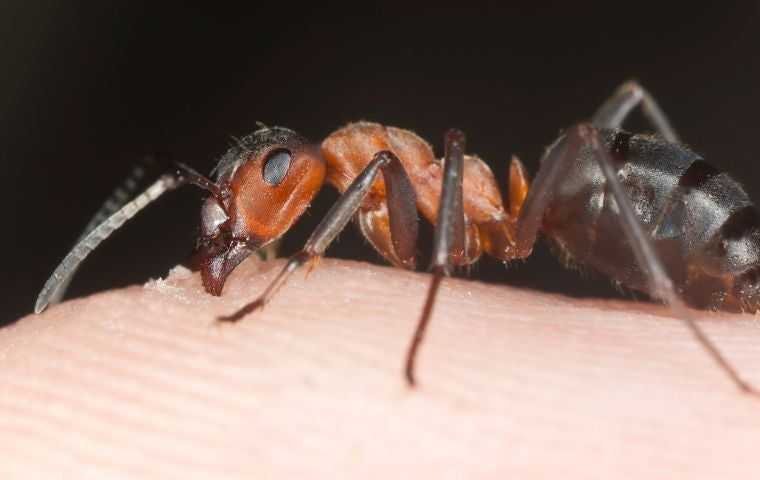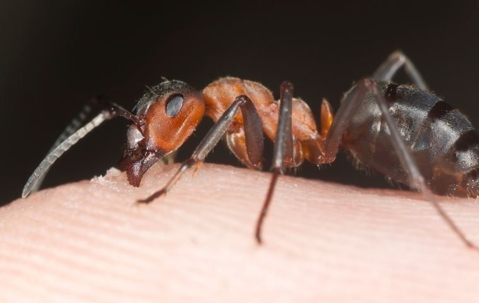Do Ants Bite?
September 12, 2023 - Ants

Indeed, ants are equipped with a specialized means of defense that allows them to bite when they perceive a threat. Ants possess mandibles, which are like small, sharp jaws, designed for a variety of functions, including grabbing and cutting. When an ant bites, it uses these mandibles to secure a grip on the perceived threat, and they can inflict pain upon their target. Ant bites are generally not harmful to humans in terms of toxicity, but they can be painful due to the ant's ability to pinch and inject a small amount of formic acid into the wound, which causes a stinging sensation.
The severity of ant bites can vary among different ant species. Some ants, like the notorious bullet ant found in Central and South America, have bites that are exceptionally painful, earning them a fearsome reputation. However, most common ant species that people encounter in their daily lives, such as black ants or red ants, may deliver bites that are more annoying than harmful. Nonetheless, it's wise to exercise caution and avoid provoking ants to minimize the chances of getting bitten.
Ant Bites
Ant bites typically appear as small, raised, reddish bumps on the skin's surface. These bumps can vary in size, depending on the ant species and the individual's sensitivity to the bite. The area around the bite may become swollen and irritated, causing discomfort and itching. In some cases, a single ant bite may be inconspicuous, while multiple bites, often grouped together, can create a more noticeable and uncomfortable reaction.
The appearance of ant bites can differ from person to person, as some individuals may have more sensitive skin or allergic reactions to ant bites, leading to more significant swelling, redness, and itching. It's essential to refrain from scratching ant bites to avoid further irritation or infection. Instead, applying a soothing topical antihistamine or over-the-counter hydrocortisone cream can help alleviate itching and reduce inflammation.
If a person experiences an allergic reaction to an ant bite, such as difficulty breathing, severe swelling, or dizziness, it is crucial to seek immediate medical attention, as these symptoms could indicate a severe allergic response that requires prompt treatment.
Ant Bite Treatments
Treating ant bites effectively can help alleviate discomfort and minimize the risk of infection. Here's a comprehensive guide to managing ant bites:
Wash the Area: Start by gently cleansing the affected area with mild soap and warm water. This helps remove any dirt or bacteria that could lead to infection.
Apply a Cold Compress: To reduce swelling and soothe the itchiness, place a cold compress or an ice pack wrapped in a cloth on the bite for about 15 minutes at a time. Be sure not to apply ice directly to the skin, as it can cause frostbite.
Over-the-Counter Remedies: Consider using over-the-counter (OTC) topical treatments such as hydrocortisone cream or calamine lotion. These can help relieve itching and reduce inflammation. Follow the product's instructions for proper application.
Antihistamines: Oral antihistamines like diphenhydramine (Benadryl) can be helpful for controlling itching and reducing allergic reactions. Follow the recommended dosage on the packaging or as advised by a healthcare professional.
Avoid Scratching: It's crucial to resist the urge to scratch the ant bite, as this can lead to further irritation and the risk of infection. Keeping the area clean and using OTC remedies should help reduce itching.
Elevate the Affected Limb: If the bite is on an extremity (arm or leg), keeping it elevated can help reduce swelling.
Pain Relief: Over-the-counter pain relievers like ibuprofen or acetaminophen may be taken as directed for pain relief if the ant bite is particularly painful.
Monitor for Infection: Keep an eye on the bite site for signs of infection, such as increasing redness, warmth, pus, or worsening pain. If any of these symptoms develop, consult a healthcare professional promptly.
Allergic Reactions: If you suspect an allergic reaction to the ant bite, especially if there's difficulty breathing, swelling of the face or throat, or dizziness, seek immediate medical attention. Anaphylaxis is a severe allergic reaction and requires emergency treatment with epinephrine.
Prevent Future Bites: To prevent future ant bites, avoid areas where ants are prevalent, seal food containers, and clean up food crumbs promptly. When outdoors, wear protective clothing, and use insect repellent.
Most ant bites can be managed effectively at home with proper hygiene, OTC treatments, and by avoiding scratching. However, if there are signs of infection or a severe allergic reaction, seek medical attention promptly.
Customer Review
Excellent! He was here within a day, and treated our house, inside and out, quicker than we could have asked. Highly recommend!!! Thank you, Bret!


